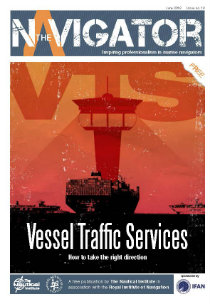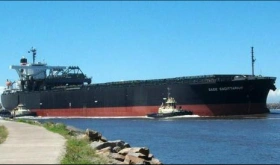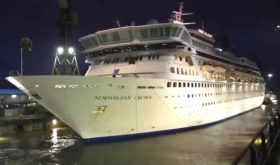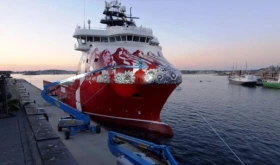In the case of an accident and especially when an environmental disaster has occurred as a result of the accident, the multitude of parties involved as well as the “impossibility” of tracing ownership of the vessel, usually when she is registered in a Flag of Convenience (FOC), makes it really difficult to conclude who was responsible for the accident or to assign share of the responsibility to the stakeholders involved. The case of the Erika, a tanker which sank off the coast of France in 1999, illustrates many of the above mentioned concerns. On December 8, 1999 the Erika, a 37,000 ton tanker flying the Maltese flag and chartered by the oil company Total SA, formerly Total Fina Elf (and Total Fina at the time of the spill), left Dunkirk and sailed through the English Channel en route to the port of Livorno in Italy.
The tanker was carrying over 30,000 tons of heavy fuel oil. As the tanker entered the Bay of Biscay, it ran into a heavy storm. Three days later, the vessel broke in two and sank due to a combination of bad weather and severe corrosion of the vessel’s structures. Ten thousand tons of oil leaked into the ocean, while the remaining cargo sank along with the Erika. The combination of the oil, a no. 2 heavy fuel oil with a specific gravity close to that of seawater that made it hard to detect and track, and the weather conditions, caused an ecological disaster. During the following days, the oil spill reached and spread along the French Atlantic coast, affecting a 400-kilometer stretch. Over 34,000 oiled birds were collected of which two-thirds died. Besides the environmental consequences, the oil spill has also had repercussions on the local coastal economy, as bans on fishing and shell fishing were imposed and the tourism industry was affected.
Following the oil spill, a report was published on the causes of the accident. Inspections held in 1997 and 1999 revealed severe corrosion of the Erika. In spite of this, RINA, a member of the International Association of Classification Societies (IACS), which consists of the world’s ten leading classification societies, renewed the certificate of seaworthiness. On February 12, 2007, more than 7 years after the spill, a trial started in the French Tribunal of First Instance in Paris to establish the liability of the parties involved, the amount to be indemnified as well as the existence of a an ecological damage.
On January 16, 2008, the Tribunal issued a decision in which it found the liability of the shipowner (Giuseppe Savarese and Tevere Shipping,) the classification society (RINA), the management company (Antonio Pollara and Panship) as well as the charterer (Total SA) and ordered them to pay 192 million euro to the plaintiffs. Total SA was also fined 375,000 euros. It was the first time that a court in France has held an entity other than the ship owner liable for environmental damage. The French magistrate made attempts to summon the Malta Maritime Authority (MMA) but it did not succeed since the MMA is an extension of the Maltese State and the Administration of the Malta Flag is covered by ‘immunity of jurisdiction’.
Tracing the ownership of the Erika proved quite a challenge for the French magistrates. The owner of the Erika at the time of the spill, through 12 off shore companies, of which 8 were Liberian and 4 Maltese, was Giuseppe Savarese an Italian ‘financier’ resident in London. Savarese owned the tanker through Tevere Shipping, a so-called ‘single ship company’. Initial enquiries as to the ownership of the Erika began in Malta (the flag State), where records disclosed that the owning company was made up of two corporate shareholders, both of them companies registered in Liberia. The two Liberian company names were as close as it was possible to get to determining the ownership of the vessel, given the anonymity laws in Liberia. The ownership of the ship remained unknown until the owner came forward voluntarily at a later stage. Antonio Pollara was the ship manager: he managed the Erika through an Italian company called ‘Panship’. The company was in charge of managing the tanker as well as communicating with RINA about the status of the tanker on its requirements and condition.
Savarese and Pollara, shipowner and manager, respectively, deliberately reduced the scale of structural repairs carried out on the Erika in 1998 for reasons of cost. In so doing, the judge said, they could not have been ignorant of the fact that they were putting the ship in danger and exposing other people to a ‘risk of particular gravity’. The Italian owner and manager received the maximum penalty of 75,000 euro (each) for ‘blatant neglect’ since they could not have been unaware of having spent only a minimal sum on the tanker’s repair.
RINA, an Italian classification society, issued the Erika class certificates as well as the other certificates on behalf of the flag State as required under the 1974 International Convention for the Safety of Life at Sea (‘SOLAS’), the Standards of Training, Certification and Watchkeeping (‘STCW’) and MARPOL regimes. Like other classification societies, RINA carried out all the inspections that are typically required. RINA argued that it should benefit from immunity from liability on the same grounds as the flag State, Malta, since its actions formed part of the statutory certification duties that it carried out on behalf of the flag State. In a technical report discussing the causes of the sinking of the Erika, RINA took the view that it had substantially complied with the applicable rules, guidelines and procedures and that the proper operation and maintenance of the ship was solely the responsibility of the ship owners or the ship managers.
However, the Experts Report to the Dunkirk Court in 2005 indicates that RINA should not have delivered certificates authorizing the tanker to navigate, given the corrosion levels. RINA has been fined 175,000 euro in addition to having to pay 192 million euro with the other defendants.
Different offices and branches of Total were implicated in the case, from the management, commercial services (Total SA) to Total Raffinage Distribution (TRD) as consignor, Total International Limited (TIL), Total Petroleum Services (TPS) and Total Transport Corporation (TTC) as voyage charterers.
When Total decided to charter the Erika (for the 4th time), it had recently undergone a five-yearly survey and repair work, during which its structures were inspected and renewed under RINA’s supervision. In 1999 alone, it had passed no fewer than 11 inspections finding it acceptable and its target factor, which is calculated by port authorities, was that of a vessel that did not show any deficiency. But the Erika was 23 years old when Total SA chartered it, had had eight different names, had changed flag twice and been classed by four different classification societies.
The French court found Total SA guilty of causal negligence and ‘as such brought the disaster about’ (French Ruling). The judge did not indict Total SA in its capacity as charterer but rather as the cargo owner because as charterer it would likely have been immune to sanctions under MARPOL and the Liability and Fund Conventions (where omission must be shown). As a result the judge held it liable for the ship’s ‘vetting’ policy. Total overlooked both the age of the Erika and the discontinuity in the ship’s technical management and maintenance. Total SA nevertheless tried to argue that the MARPOL Convention took precedence over the 1983 French Law. Total SA also asked how it could be found guilty for shortcomings in a procedure that it had introduced voluntarily in order to improve its shipping safety standards. Total SA will have to pay a maximum fine of 375,000 euro.
Giuseppe Savarese, the owner of the Erika, argued that Malta should be held responsible for the Erika spill. In September 2002, the French magistrate Dominique de Talancé held the MMA and its Director responsible for ‘endangering the lives of others’ and of having been ‘an accomplice in pollution’. However, efforts to hold the MMA accountable failed as a result of the fact that the MMA is a public entity and thus enjoys immunity from prosecution under national laws.
It is a leitmotiv in oil spills like the Erika, that there is always an entity that regularly escapes scrutiny, the flag State. Although the flag State should ensure that all international regulations and measures relating to the seaworthiness of a vessel flying its flag are complied with, because of immunity issues and the inability (in most cases) of a State to be sued under the laws of another State, Malta could not be tried in France over its role in the Erika spill. However, France could have possibly lodged a complaint against Malta in connection with the Erika spill in front of the International Tribunal for the Law of the Sea.
The Erika episode has led to the implementation of EC Directive 2005/35 on ship source pollution, as well as a decision imposing civil liability on the ship-owner, the charterer and the classification society. In addition, it may have moved a number of constituencies closer to a determination to modify the system so that flag States may be held accountable under national laws. Finally, still on the drawing board is the plan to set up an international maritime criminal court.
Finally, the French ruling, included the important recognition of the future ecological prejudice that flows from damage to the environment, providing grounds for parties that suffer such future damage to sue for compensation. However, the case against the Erika also exposed in clear detail the ability of the flag State to evade its responsibility, with virtual impunity, under international law, to monitor and ensure that ships flying its flag are in compliance with the treaties and regulations to which the flag State is a party.
Source: ITF














Leave a Comment